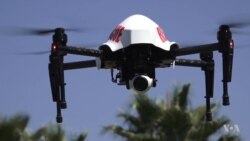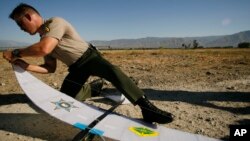A growing number of U.S. public safety agencies have been acquiring drones. The Center for the Study of the Drone at Bard College finds more drones have been purchased last year than in the previous years combined. Close to 350 emergency responders, such as state and local law enforcement agencies and fire departments have purchased unmanned aircraft systems known as UAS.
In some cities, there have been debates over whether local law enforcement should be using drones. That debate is happening in Los Angeles, where it’s police and sheriff’s departments would like to add small unmanned aircraft with cameras to their tool kits.Not everyone supports the idea.
“Number one as we all see, the expanding and escalation of militarization of local law enforcement agencies,” said Hamid Khan, coordinator of the Stop LAPD Spying Coalition.
An immigrant from Pakistan, Khan said he is aware of a history of racism in the United States. He said law enforcement in Los Angeles is no different.
“I think it was imperative for me as an individual and as a part of an immigrant community that you know, what true values of the United States do I really learn? And the true values came from building a culture of resistance,” said Khan
The resistance for Khan comes in the form of speaking out and organizing a petition against local law enforcement’s use drones. Los Angeles Police would like to start a pilot program. A Los Angeles County Sheriff’s Department test program is underway.
Los Angeles law enforcement officials said the UAS acts as an extra pair of eyes for them.
Eyes in the sky
“It allows us to get a view of a particular situation that’s too dangerous to immediately to put a human into such as hazmat (hazardous materials) spill, a bomb response for IEDs (improvised explosive devices).We also use it for search and rescue or in SWAT (Special Weapons and Tactics) operations, or active shooter to pinpoint where the gunman is so that we don’t have to put people in danger," said Captain Jack Ewell of the Los Angeles County Sheriff’s Department's Special Enforcement Bureau.
“I could tell you that this department has absolutely no intention of weaponizing the UAS. In fact, the ones that we’re going to get, we’re going to make sure that it doesn’t have the capability of being weaponized,” said Horace Frank, Deputy Chief and Commanding Officer of Los Angeles Police Department's Counter-Terrorism and Special Operations Bureau.
Los Angeles residents of various ethnicities support law enforcement using a UAS to fight crime.
“There’s a lot of bad guys out there.So you got to keep the good guys safe.” said Eddie Lopez who is Latino.
“I think in certain situations, they do need the drones,” said Damien Walker who is African American.
There are also residents who distrust law enforcement and oppose the use of drone technology, fearing an invasion of privacy and that police would unfairly use it against minorities.
“I think the drone would just be a new way of seeing me, what people like me are doing that are not doing anything,” said Toriano Weatherspoon who is African American.
Not used for surveillance
Both Los Angeles Police and Sheriff officials said the UAS they use will not be used for surveillance.
"We were very careful to craft guidelines to ensure that the community was safe in knowing that this tool will never be used for surveillance type purposes, anything that would invade their privacy," said Ewell.
Khan, however, remains distrustful of local law enforcement and worries about what he calls "mission creep," the broadening of an objective over time, in this case, of the expanding use of UAS among law enforcement.
"We’re not going to go beyond the guidelines that we’ve set.We’re very transparent in our use of the unmanned aircraft. We alert the public every time we use it and where we’re using it," said Ewell.
“There are a lot of folks out there for whatever reason have some distrust in terms of what our motive is behind the use of this, and I think it’s incumbent upon us to try to allay those trusts and those concerns and that is exactly why we’re having these series of community meetings.”
Frank added, "There are some people, I’m not naïve, I know there are people who are just absolutely not going to believe it, end of story, no matter what you tell them. And I understand that."






